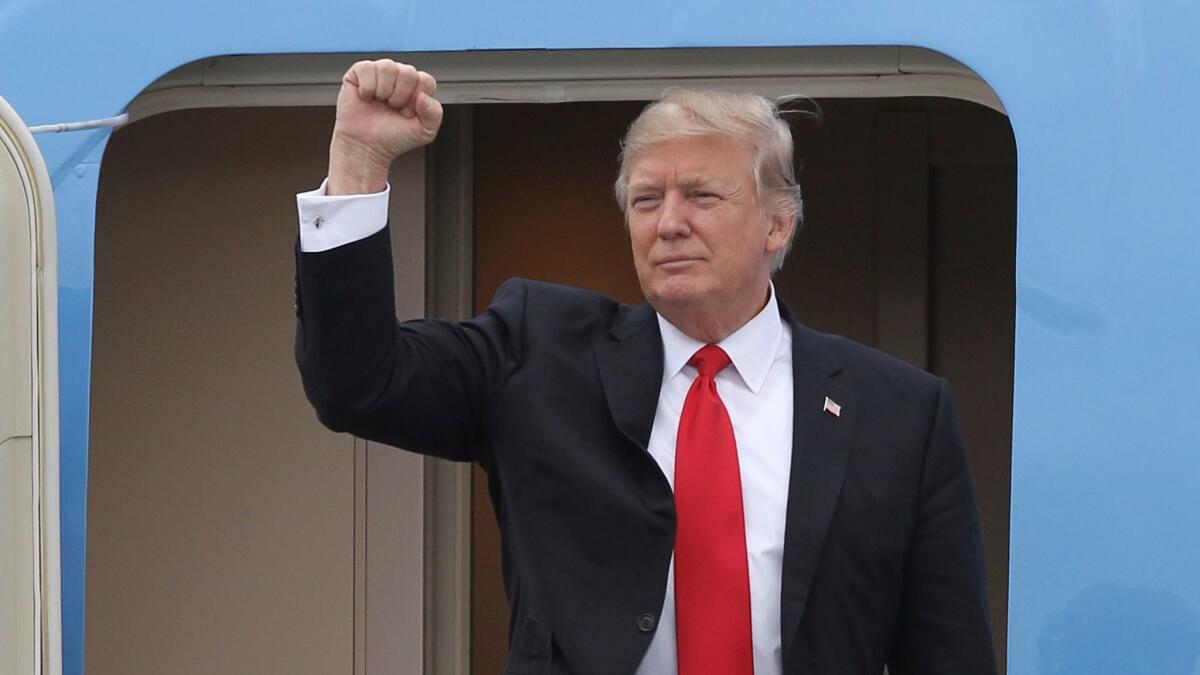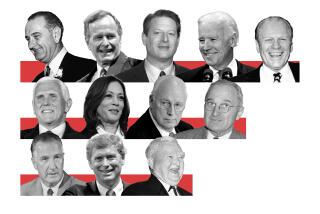Column: Whoâs responsible for driving the Trump-Russia story? Trump, of course

There may yet be an innocent explanation for all the conversations coming to light between Donald Trumpâs presidential campaign and the government of Russia. But the way Trump and his team have responded to questions about the contacts sure hasnât made them look innocent. Quite the contrary.
It all begins with Trump himself, who bragged in 2013 that he was close to Russian President Vladimir Putin, but now claims he has had no contact with Moscow at all â or at least (in a particularly weird denial) that he hasnât made a phone call to Russia in 10 years.
Also suspicious: the Trump aides who secretly inserted a Russia-friendly plank in the Republican Party platform last summer, only to deny later that they had done any such thing.
Then thereâs Michael Flynn, Trumpâs first national security advisor, who discussed U.S. sanctions with the Russian ambassador, then denied it. If Flynn had merely lied to the public, he might still have his job; but he lied to Vice President Pence, so he was fired.
Itâs not substance that has tripped up Trump and his entourage; itâs their inability to keep their stories straight.
Last week, it was Atty. Gen. Jeff Sessions. âI did not have communications with the Russians,â Sessions told a Senate committee. Except he did.
And thereâs Jared Kushner, Trumpâs son-in-law and advisor, who attended a meeting with Moscowâs ambassador â a fact the White House neglected to mention until it was reported by the New Yorker.
See a pattern? False or misleading denials, followed by revelations in the media, followed by attempts to explain the denials away â followed by angry tweets from the president blaming it all on the media, the Democrats and leaks.
This is how a low-simmering controversy â in this case, the mystery of Trumpâs relationship with Russia â turns into a full-blown scandal.
The underlying questions remain important: Is Trumpâs fondness for Putin more than just a personal quirk? When U.S. intelligence agencies reported that Russia was meddling in the presidential election, why did Trump attack the CIA and defend Putin? Were all those conversations with Russia innocent chats about foreign policy, or evidence of collusion?
But itâs not the substance that has tripped up Trump and his entourage; itâs their inability to keep their stories straight.
Itâs often claimed that in Washington scandals, the cover-up is worse than the crime. Thatâs not quite right. The reason the cover-up is important is that itâs easier to uncover than the underlying crime (if there was one). The cover-up is how people get caught. Just ask Flynn. And the cover-up often is what keeps a scandal alive.
Indeed, the president and his top aides already have broken all the traditional rules of scandal management.
Rule one: When thereâs bad news, get it out fast, and get it out all at once.
Rule two: Donât spend time explaining. (âWhen youâre explaining, youâre losing,â Ronald Reagan said.)
Rule three: Apologize and move on. Voters are often willing to forgive a politician who makes a mistake, but only if he asks their forgiveness.
Apologies, of course, are not Trumpâs style. His natural reflex has been to denounce the media, blame his political opponents and remind everyone that he won.
âThis whole narrative is a way of saving face for Democrats losing an election that everyone thought they were supposed to win,â the president of the United States tweeted last week. âThe real story is all of the illegal leaks of classified and other information. It is a total witch hunt!â
That kind of bluster worked for Trump during the campaign, but itâs not likely to help him as much now that heâs president. He canât even rely on his partyâs control of Congress to prevent scrutiny.
Some Republicans in the Senate, led by John McCain of Arizona, Lindsey Graham of South Carolina and Marco Rubio of Florida, are worried enough about a Russian threat to American democracy to insist on a serious investigation.
Last week, several leading House Republicans publicly demanded that Sessions recuse himself, including Kevin McCarthy of Bakersfield, the second-ranking member of the GOP conference. (McCarthyâs main job is ensuring that House Republicans keep their majority, including more than two dozen endangered members in districts Trump lost last year.)
And Trump, by publicly attacking the FBI and CIA, has alienated some of the civil servants who already are investigating Russiaâs actions as part of a joint task force â virtually guaranteeing that someone will leak if their findings are suppressed.
Most presidents donât stumble into a full-blown scandal until their second term. That was true for Richard M. Nixon, Ronald Reagan and Bill Clinton. Trump, however, arrived at the White House with a scandal already brewing â and a well-established record of mendacity. That record, plus the fact that he reacts to new revelations in a way that makes him look so guilty, is why this story isnât going away.
He can rage at the media, Democrats and leakers all he wants. President Trump has brought this problem on himself.
Twitter: @DoyleMcManus
Follow the Opinion section on Twitter @latimesopinion or Facebook
More to Read
A cure for the common opinion
Get thought-provoking perspectives with our weekly newsletter.
You may occasionally receive promotional content from the Los Angeles Times.











